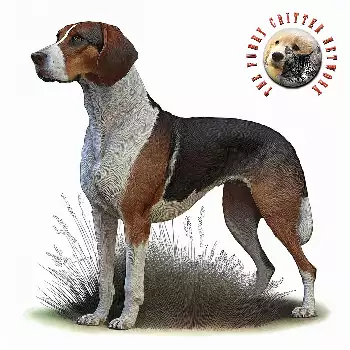The Jugoslovenski Gonic represents a remarkable example of regional breed development, shaped by centuries of selective breeding for hunting excellence in the challenging terrain of the Balkan Peninsula. These medium-sized scent hounds embody the perfect balance between power, endurance, and agility needed for tracking game across mountainous and forested landscapes. Their robust construction and determined temperament reflect their heritage as working dogs bred primarily for function rather than aesthetic appeal.
Standing between 18 and 22 inches at the shoulder, the Jugoslovenski Gonic displays a well-proportioned body that is slightly longer than it is tall, creating an ideal framework for sustained pursuit of quarry. The breed's sturdy bone structure provides the foundation for tireless hunting, while their moderate size allows them to navigate dense underbrush and rocky terrain with ease. Males typically exhibit slightly larger dimensions than females, though both sexes maintain the breed's characteristic athletic build.
The head of the Jugoslovenski Gonic is distinctly hound-like, with a broad skull that gradually tapers toward a well-developed muzzle. The length of the muzzle roughly equals that of the skull, creating balanced proportions that support the breed's exceptional scenting abilities. The nose is large and well-developed, typically black in coloration, with wide nostrils that facilitate the breed's renowned tracking capabilities. The lips are moderately developed and close-fitting, avoiding excessive flews that could interfere with scenting work.
The eyes of the Jugoslovenski Gonic convey intelligence and determination, set at a moderate depth within the skull to provide protection during hunting activities. Eye color typically ranges from dark brown to amber, harmonizing with the coat coloration while maintaining an alert, focused expression. The medium-sized ears are set at eye level and hang close to the cheeks, their length extending to approximately the tip of the nose when pulled forward. The ear leather is moderately thick and well-feathered, contributing to the breed's acute hearing abilities.
The neck of the Jugoslovenski Gonic is strong and moderately long, blending smoothly into well-laid shoulders that provide efficient forward reach during pursuit. The topline remains level and firm, supported by a straight, muscular back that demonstrates the breed's endurance capabilities. The chest is well-developed with good depth, providing ample lung capacity for sustained work, while the ribcage shows moderate spring to accommodate the heart and lungs without creating excessive bulk.
The coat of the Jugoslovenski Gonic varies between the two primary varieties but maintains consistent characteristics of durability and weather resistance. The hair is short, dense, and lies close to the body, providing protection from brambles and harsh weather conditions encountered during hunting expeditions. The coat texture is slightly coarse to the touch, with a natural oil content that helps repel moisture and debris. Regular seasonal shedding occurs, with more pronounced coat changes during spring and fall transitions.
Coat Type
Short, dense, weather-resistant double coat with coarse outer hair
Coat Length/Shedding
Moderate shedding year-round with seasonal increases; requires weekly brushing
Openness to Strangers
★
★
★
★
★
Reserved but not aggressive; requires proper socialization for stranger acceptance
Playfulness Level
★
★
★
★
★
Moderate to high playfulness with family; enjoys interactive games and activities
Watchdog/Protective Nature
Natural alertness makes them excellent watchdogs; will bark to announce visitors
Adaptability Level
Moderate adaptability; best suited for rural or suburban environments with space
Trainability Level
★
★
★
★
★
Highly intelligent and trainable; responds well to consistent, positive methods
Energy Level
High energy requirements; needs 2+ hours of vigorous daily exercise
Barking Level
Moderate to high vocalization; bred to bay while tracking and hunting
Affectionate with Family
Deeply loyal and affectionate with their family members; forms strong bonds
Good with Young Children
Generally good with children when properly socialized; patient and gentle nature
Good with Other Pets
Can coexist with other dogs; may chase smaller animals due to hunting instincts
The gait of the Jugoslovenski Gonic demonstrates the breed's functional design, with smooth, ground-covering movement that conserves energy during extended hunts. At a trot, the breed shows good reach and drive, maintaining a level topline and demonstrating the coordination necessary for tracking work. The feet are compact and well-arched, with thick pads that provide protection on rocky surfaces and adequate traction on various terrain types.
Color variations in the Jugoslovenski Gonic reflect the two primary varieties within the breed. The mountain variety typically displays a black and tan pattern, with rich tan markings above the eyes, on the muzzle, chest, legs, and under the tail, set against a predominantly black background. The tricolor variety exhibits a more complex pattern featuring a combination of black, tan, and white markings, often with a distinctive white blaze on the face and white markings on the chest, feet, and tail tip.
The temperament of the Jugoslovenski Gonic reflects their working heritage, combining determination and independence with loyalty and affection toward their human families. These dogs possess the mental strength and persistence required for tracking wounded or elusive game across difficult terrain, yet they maintain the social cooperation necessary for pack hunting. Their intelligence is evident in their problem-solving abilities and their capacity to work independently while remaining responsive to their handler's direction.
The breed's voice is an essential aspect of their working ability, with a distinctive bay that carries well across distances and varied terrain. This vocalization serves to communicate the dog's location and progress to hunters, making it an integral part of their function rather than simply noise. The quality and tone of the voice are considered important characteristics, with experienced hunters able to interpret different vocalizations to understand what the dog has discovered.
Overall, the Jugoslovenski Gonic represents a successful synthesis of form and function, with every aspect of their physical and mental characteristics contributing to their effectiveness as hunting companions. Their moderate size, robust health, and adaptable nature make them suitable for various hunting applications while maintaining the hardiness and independence that characterizes the scent hound group. Understanding these fundamental characteristics is essential for anyone considering this breed, whether for hunting purposes or as a family companion.

